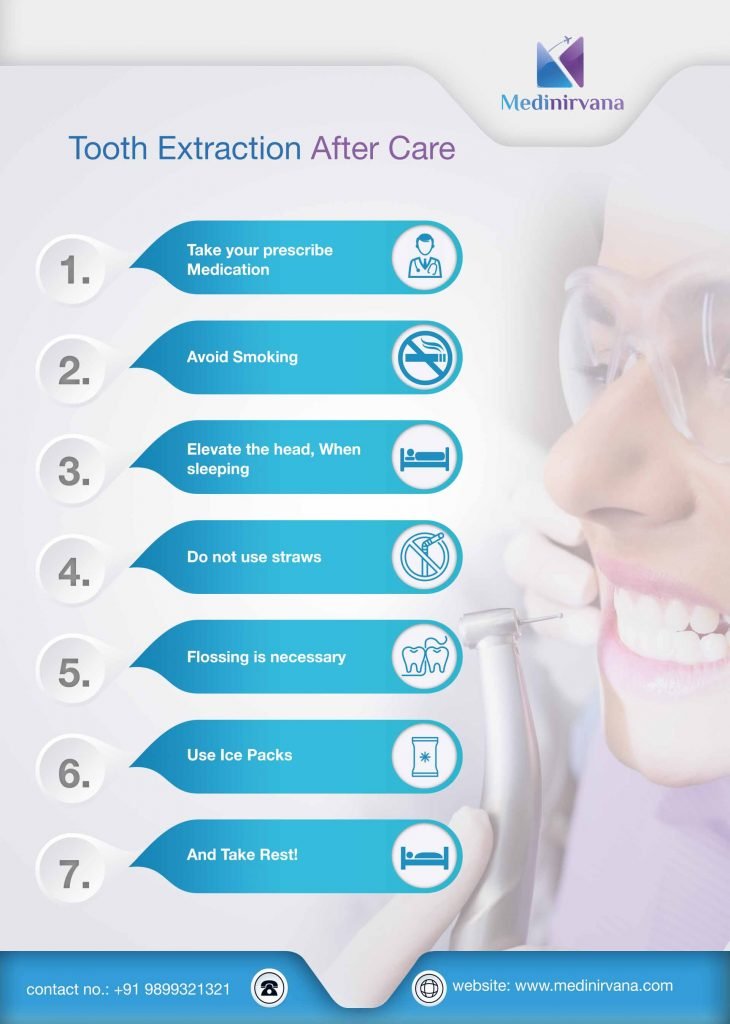Tooth extraction is permanent removal of the tooth from its socket. Routine tooth extractions are done by trained dentists while complex surgical extractions are done by suitably trained general dentists or oral surgeons.
Usually, people are concerned about their dental hygiene and take an effort in maintaining good oral health. However, despite their best efforts, one or more teeth may require extraction. If you are concerned about persistent toothache or seeking to remove crooked, uneven teeth, contact a dental expert for consultation. In a common scenario, the dentist tries to save the tooth by procedure like root canals and if your dentist recommends tooth extraction, it means there is no other way to save your tooth.
Many countries offer a range of dental services including Turkey, Philippines, Costa Rica, etc. India is the best country for dental tourism due to availability of world class dental services at affordable ranges.
Table of Contents
Feel free to skip ahead if one topic catches your eye:
- When Should you Consider Tooth Extraction?
- How to Prepare before travelling for Dental Treatment?
- Tooth Extraction: pre and post treatment care in India
- Alternatives of Tooth Extractions
- Cost of Tooth Extraction in India
- Why Choose India for Tooth Extraction?
1. When Should you Consider Tooth Extraction?
Identifying early warning signs can prevent further tooth problems and save you from complex, and potentially more expensive surgery.
If you are suffering from any of the following signs, you may require a tooth extraction procedure:
- Tooth decay or damage
- Constant and persistent pain
- Swelling and discomfort
- Wisdom tooth creating immense pressure in jaw and causing headache
- Wisdom tooth crowding adjacent teeth and affecting oral structure
- Crooked or broken tooth affecting your smile
When is tooth extraction recommended?
The permanent teeth are supposed to survive for a lifetime. There are several reasons why your dentist will recommend tooth extraction including:
- Risk of infection: High sugar intake and poor oral hygiene are two common reasons for tooth decay. In some cases, the tooth infection can damage gum and requires immediate intervention to avoid further damage.If your tooth is severely infected and left untreated for a long time, it might hamper your oral hygiene as well. Hence, it is necessary to minimize the risk of infecting gum.
- Gum disease: Damaged gum can result in the loosening of tooth roots and might even affect the sensation of the tooth. Depending upon the extent of the disease, the dentist will recommend tooth extraction.
- Wisdom tooth: These teeth appear in late twenties and most of the time, there isn’t enough space for them to grow, and due to this, they grow at odd angles. As a result, they start crowding the adjacent molars, causing pain and swelling. This may also result in gum damage, infection, and decay of other teeth. Thus, getting your wisdom teeth removed will prevent crowding and damage to the other teeth.
- Fractured teeth: In some cases, the tooth is broken, causes significant trauma, and requires extraction.
- Extra teeth: some people develop additional teeth causing a similar pain and complications as that of wisdom teeth. These need to be extracted to maintain oral health and space.
2. How to Prepare before travelling for Dental Treatment?
Choosing a specialist to perform the procedure: Check the credibility and experience of the oral surgeon. Also, consider the cost of the procedure before making a decision. Once you have received your quote from the dentist, you can check with the insurer how much is covered.
Consultation with your specialist: Discuss with your specialist about the procedure, precautions to take, risk factors, follow-up appointments, etc. Talk about concerns about the procedure and understand the treatment. Inform your specialist if you are suffering from any other health condition such as diabetes, thyroid, liver disease, etc. You should also mention allergies.
Preparing for a trip to India: Ask your dentist about the duration of stay required to complete the procedure and plan accordingly. Do not forget to carry your medical reports, recent test results, letter from hospital or your physician, etc.
You will be asked to avoid following things few days or weeks before the procedure:
- Taking blood thinning medicines
- Consumption of alcohol or smoking
Maintaining a healthy lifestyle will help the recovery process and reduce complications.

3. Tooth Extraction: pre and post treatment care in India
Before procedure:
Initial consultation: Your dentist will check your dental health, your dental history, and also conduct X-rays. He/she will ask about your medical history, current medicines you are taking, and allergies. By assessing the condition of your tooth, your dentist will recommend a suitable procedure for you.
Common questions to ask are:
- What type of procedure is suitable in your case?
- What type of anesthesia is required?
- How long will it take to recover and what precautions should be taken?
- Is there any risk of nerve damage?
Preparing for the procedure: Some medicines can affect the process of healing. Discuss your current medical status and medicines you are taking. You will be asked to avoid a few medicines like:
- Aspirin
- Blood thinners
- Insulin
- Arthritis medicines, etc.
Post-operative care:
- Organize a lift home or a companion to take you safely back as you will be under sedation.
- Schedule some time off from work to get the surgery done and to rest afterwards, for a speedy recovery.
- You will need to fast for 5 to 6 hours before the procedure and follow the other antibiotic course too.
The routine procedure of tooth extraction is simple and relatively less painful.
Recovery and promoting the healing process:
Tooth extraction recovery time varies from patient to patient, type of procedure (simple or surgical), location, and the type of tooth. The wisdom tooth removal procedure requires more time to heal than the other ones. This means that the patients who had incisor extraction recover faster.
After the tooth is removed, there are few instructions to follow for speedy recovery:
- Take rest for a day after the procedure and avoid any strenuous activity for a week after. This helps expedite the recovery process.
- Make sure you take painkillers as prescribed by your dentist.
- Eat soft food and juices while the extraction site is healed.
- Avoid spitting, and forcefully rinsing your mouth. After 48 hours, rinse your mouth with slightly warm water for faster healing. Also, avoid using a straw for drinking juice, etc. a few days.
- Be gentle while brushing and cleaning the teeth for a few days and avoid the extraction area.
- To alleviate swelling, you can use an ice-pack for 10-12 minutes to apply on your face and jaw-line.
- After a couple of days, you will start feeling better and swelling will subside. In a week’s time, you will be comfortable and get back to routine.
Types of Tooth Extraction
There are two options for tooth removal:
Simple procedure: This is more common for teeth other than wisdom teeth and it is frequently used for teeth that are visible and can be easily pulled out. This involves using local anesthesia and loosening of the teeth.
Surgical procedure: The procedure is required for teeth that are not yet erupted or broken off at the gum line requiring surgical extraction.This is a more complex procedure as it may involve bone cutting and sutures as well.
4. How long does the tooth extraction take?
The duration of the procedure depends upon how deep the roots of the tooth are and the available access point for the dentist.
The standard time required is between 30 to 60 minutes and the procedure is done in one session.
5. Cost of Tooth Extraction in India
The cost of the procedure will depend upon the complexity of the treatment required, type of anesthesia used, fees of surgeon, etc. Removal of wisdom cost is higher than other teeth removal procedures. In metro cities like Delhi, Mumbai, the cost of tooth extraction ranges between 4,000 Rs to 10,000 Rs. which commonly includes consultation, tooth extraction, and after care services.
6. Why Choose India for Tooth Extraction?
If you decide to choose India as a destination for a tooth extraction procedure, your dental operation will go much smoothly while you’re on vacation.
The country is known for the presence of highly qualified, skilled, and experienced dental professionals offering a range of dental services.
You can avail more quality services at highly affordable prices compared to the standards of services offered at western countries like the US. The cost of the dental services in India is around 10 times less than many of the developed countries. On an average the patients can save approximately 50% on the dental procedure.
The country offers simple Visa procedures and transportation charges are cheap, which makes traveling easy and hassle-free.
The medical staff speaks English in a fluent manner and offers high standards of hygiene and equipment sterilization.
This is the reason why it’s the destination of choice for the most foreign patients.
Take away
Even though cost of the treatment is the driving factor for tourism in India, the country also offers highly trained and experienced dental professionals. The standard of dental work is of international standards and technology, equipment and material used are of high quality. Visiting India for dental treatment will give you the chance to enjoy world-class dental care in a country rich in history






Leave a Reply